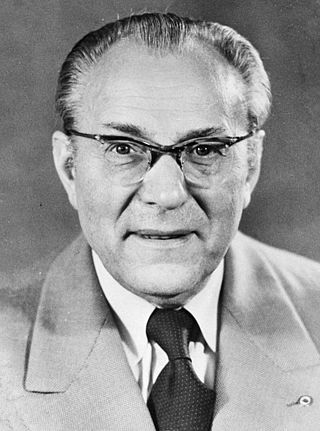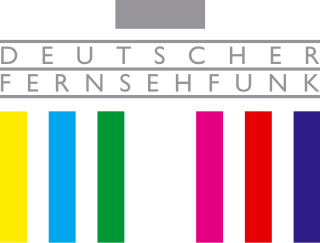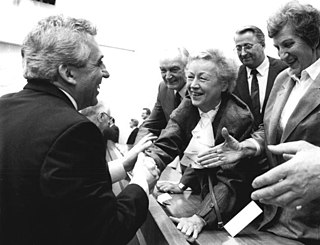
East Germany, officially known as the German Democratic Republic, was a country in Central Europe from its formation on 7 October 1949 until its reunification with West Germany on 3 October 1990. Until 1989, it was generally viewed as a communist state and described itself as a socialist "workers' and peasants' state". The economy of the country was centrally planned and state-owned. Although the GDR had to pay substantial war reparations to the Soviets, its economy became the most successful in the Eastern Bloc.

The Volkskammer was the supreme power organ of East Germany. It was the only branch of government in the state, and per the principle of unified power, all state organs were subservient to it.

The Christian Democratic Union of Germany was an East German political party founded in 1945. It was part of the National Front with the Socialist Unity Party of Germany (SED) and a bloc party until 1989.

Friedrich Wilhelm Reinhold Pieck was a German communist politician who served as the chairman of the Socialist Unity Party from 1946 to 1950 and as president of the German Democratic Republic from 1949 to 1960.

Otto Emil Franz Grotewohl was a German politician who served as the first prime minister of the German Democratic Republic from its foundation in October 1949 until his death in September 1964.

Wilhelm Stoph was a German politician. He served as Chairman of the Council of Ministers of the German Democratic Republic from 1964 to 1973, and again from 1976 until 1989. He also served as chairman of the State Council from 1973 to 1976.
These are lists of political office-holders in East Germany. The political leadership of East Germany was distributed between several offices. However, until the Volkskammer removed a section in the GDR's constitution guaranteeing their monopoly on political power on 1 December 1989, the Socialist Unity Party of Germany (SED) held ultimate power and authority over state and government. Thus, the head of the SED's Politburo of the Central Committee was the de facto leader of the country.

Manfred Gerlach was a German jurist and politician, and the longtime leader of the East German Liberal Democratic Party. He served as Chairman of the Council of State and was thus head of state of East Germany from 6 December 1989 to 5 April 1990.

Gerald Götting was a German politician and chairman of the East German Christian Democratic Union (CDU) from 1966 until 1989. He served as President of the People's Chamber (Volkskammer) from 1969 to 1976 and deputy chairman of the State Council of East Germany from 1960 to 1989.
The German Democratic Republic was created as a socialist republic on 7 October 1949 and began to institute a government based on the government of the Soviet Union during the Stalin era. The equivalent of the Communist Party in East Germany was the Sozialistische Einheitspartei Deutschlands, which along with other parties, was part of the National Front of Democratic Germany. It was created in 1946 through the merger of the Communist Party of Germany (KPD) and the Social Democratic Party of Germany (SPD) in the Soviet Occupation Zone of Germany. Following German reunification, the SED was renamed the Party of Democratic Socialism (PDS), which eventually merged with the West German Electoral Alternative for Labor and Social Justice to form the modern Left Party.
The Council of Ministers was the cabinet and executive branch of the German Democratic Republic from November 1950 until the country was reunified on 3 October 1990. Originally formed as a body of 18 members, by 1989 the council consisted of 44 members.

Hilde Benjamin was an East German judge and Minister of Justice of the German Democratic Republic. She is most notorious for presiding over the East German show trials of the 1950s, which drew comparisons to the Nazi Party's Volksgericht show trials under Judge Roland Freisler. Hilde Benjamin is particularly known for being responsible for the politically motivated prosecution of Erna Dorn and Ernst Jennrich. In his 1994 inauguration speech German President Roman Herzog cited Hilde Benjamin as a symbol of totalitarianism and injustice, and called both her name and legacy incompatible with the German Constitution and with the rule of law.

The State Council of the German Democratic Republic was the collective head of state of the German Democratic Republic, most commonly referred to as East Germany, from 1960 to 1990.

The Social Democratic Party in the GDR was a reconstituted Social Democratic Party existing during the final phase of East Germany. Slightly less than a year after its creation it merged with its West German counterpart ahead of German reunification.

The National Defense Council of the German Democratic Republic was created in 1960 as the supreme state body of the German Democratic Republic in charge of national defense matters, including mobilization planning. The NVR held the supreme command of the GDR's armed forces, and the NVR's chairman was considered the GDR's commander-in-chief.

Deutscher Fernsehfunk was the state television broadcaster in the German Democratic Republic from 1952 to 1991.

Ernst Melsheimer was a German lawyer.

Inner German relations, also known as the FRG-GDR relations, East Germany-West Germanyrelations or German-German relations, were the political, diplomatic, economic, cultural and personal contacts between the Federal Republic of Germany and the German Democratic Republic, at the period of the West-East division in German history from the founding of East Germany on 7 October 1949 to Germany's reunification on 3 October 1990.

Wolfgang Herger is a German former politician and high-ranking functionary of the Free German Youth (FDJ) and the Socialist Unity Party (SED).

Klaus Sorgenicht was a German politician and party functionary of the Socialist Unity Party (SED).
















